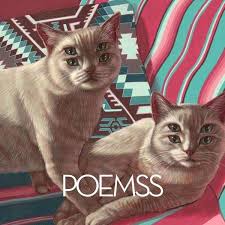Poemss, a collaboration between Venetian Snares’ Aaron Funk and Joanne Pollock, was made in the early hours of the morning at Funk’s Winnipeg home, and seems to channel the freak sensations of lucid dreaming into music. Abandoning, for the moment, the hard-edged dance music with which he made his name, Funk instead has worked with Pollock, a relatively unknown Canadian artist, to produce an album both ethereal and melancholy. Poemss has struck a minor key that works in a series of soft drums and reverb, one that pitches into the nursery-rhyme territory of classicist Carl Orff and back into the Braindance world of the weird, schizophrenic beats championed by Planet Mu founder Mike Parandinas.
This is a school of thought where the only tradition is innovation. It’s a re-imagining of what can be danceable: slivers of rapid staccato interspersed with snatches of domestic noise. It renders the boundaries between analogue and digital obsolete and casts aside melody and rhythm in favour of something altogether more anarchistic. Poemss breaks from this: there is a conscious decision that these pieces do fit into the structure of writing for the pop world. Yet it adheres to the sonic sensuality from which Funk originally emerged: the electronic textures are evocative of icicles and the spread of ripples on a puddle’s surface, where human voices take on a wordless quality, like birdsong.
These are songs, not in the traditional structure of verse, chorus and bridge, but a collection of words and images filtered through texture, like watching TV through someone else’s rain-streaked windows. ‘Moviescape’ and ‘Heads On Heads’ walk the line between pop and the dance foundations that both Funk and Pollock work within, but they are not the highlights of the album. Brave as it may be to venture into the pop realm, these songs are much less remarkable than their peers. Pollock’s voice is sweet where Funk’s is sinister, they complement each other in an act of "good cop, bad cop" except it occasionally becomes "good cop, good cop." Sometimes this falls short: ‘Moviescape’ almost has a psychedelic-era Beatles tinge, but without the Liverpudlian acidity of John Lennon’s voice that stopped ‘Strawberry Fields Forever’ from becoming saccharine.
There is a fantastical beauty to Pollock’s lyricism in the way that language is reduced: the relationship between words and meaning is exchanged for one of words and sound. It’s a playful transition, where even syllables become irrelevant, manipulated and elasticated beyond context. Words are used here in a sonic collage, in some cases lacquered over, in some cases stark. Pollock’s poems hint at a wider narrative behind the album but (thankfully) lose it: this is not a piece of work that needs to tell a story. Some are overt references to love. Others more peculiar. Opening track ‘Ancient Pony’ is a nightmarish, borderline comedic repetition: "I hereby present you with this hair follicle of an ancient pony who was once known to rescue children in distress." Aaron Funk’s growl manages to take it far from the peripheries of cute. This mythical equine beast bears more in common with the "secret unicorn lair" discovered by North Korean archaeologists in Pyongyang than it does Pegasus.
These voices are interspersed to the point of abstraction throughout. Sometimes they become just a sonic technique – an angelic coo on some parts of the record, but elsewhere the poems the album is named for become the focal point of the music. Often Pollock’s poems become de-constructed, repeated until they take on a structural rather than lyrical role. The words stretch and retract, losing their meaning before swiftly regaining it.
The best duos know how to amplify each other’s talents. Pollock draws out Aaron Funk’s rarely utilised capacity for melody: in turn, he knows how to work a vocal into a piece of music, reducing its vocabulary in the deconstruct-reconstruct methods he has been pioneering for over 20 years. There is something reminiscent of the off-kilter childhood of Boards Of Canada on many a song on Poemss, a euphoric, mystical quality that in places hides the warmth of Pollock’s voice beneath "oohs" and warbling piano notes. From the glockenspiel sounds on ‘Gentle Mirror’ that pick up on a slow beat, to the call-and-response that sounds like people singing into a cave and recording the echo, there is the sense of a relationship building in confidence as the album develops. It’s a piece of surrealism and absolutely beautiful to listen to.


